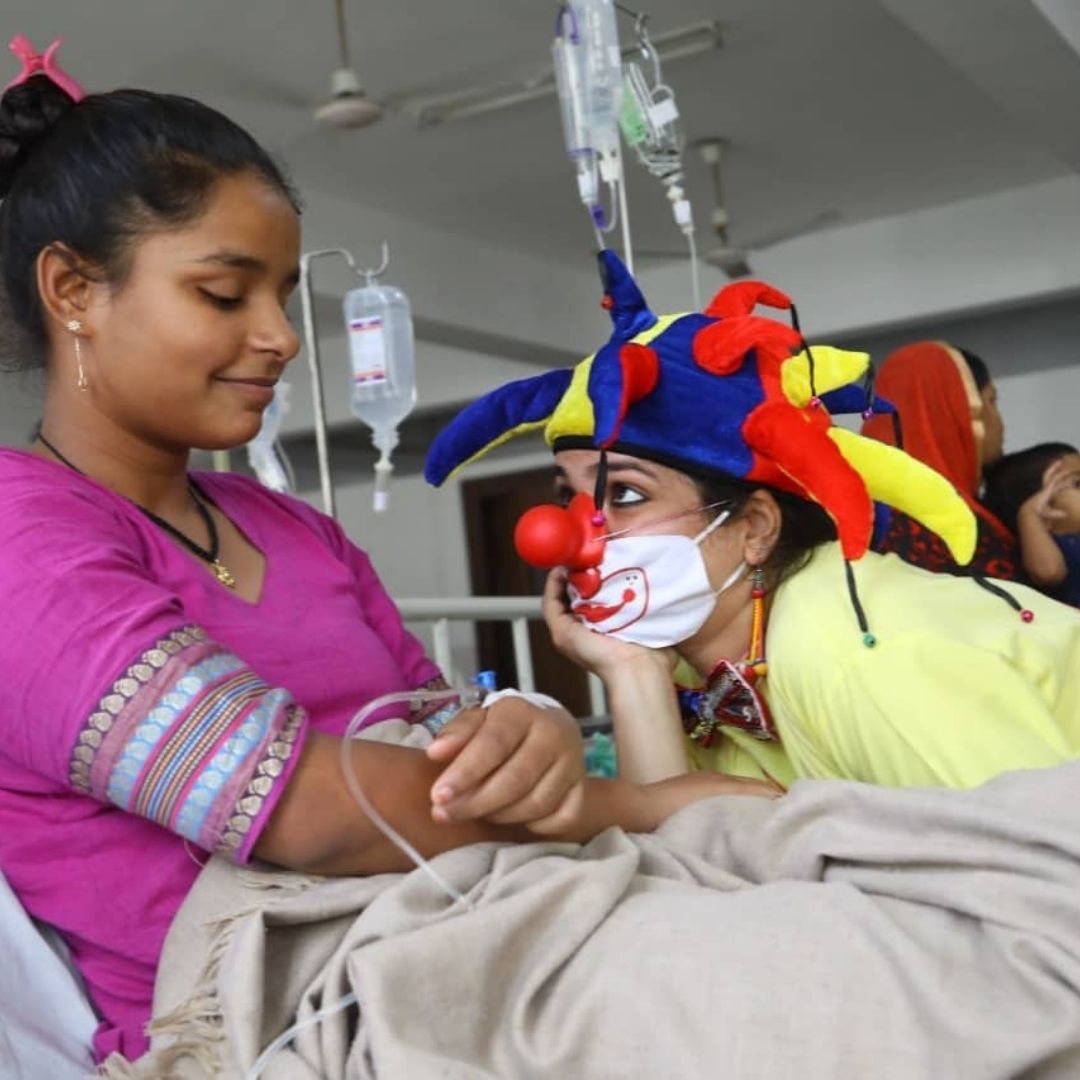
Image Credits: Clownselors/Facebook
Let Laughter Be Your Medicine: How Delhi-Based NGO Clownselors Aims To Highlight Mental Health With Smiles
Writer: Akanksha Saxena
I am a budding journalist who loves to write stories that have the ability to connect with people.
India, 20 Oct 2021 4:34 AM GMT | Updated 20 Oct 2021 5:02 AM GMT
Editor : Snehadri Sarkar |
While he is a massive sports fanatic, his interest also lies in mainstream news and nitpicking trending and less talked about everyday issues.
Creatives : Akanksha Saxena
I am a budding journalist who loves to write stories that have the ability to connect with people.
Sheetal Agarwal's one-of-a-kind initiative indulges in what is known as 'Medical Clowning', to not only bring smiles in vulnerable spaces but to also teach the importance of mental health in our lives.
We all have heard of the phrase 'laughter is the best medicine.' This is said quite often as people believe that humour is a great way to distract ourselves from anything morbid. However, this is easier said than done. We always focus on our physical well-being and take care of it. In turn, we ignore our mental health altogether and do not pay much attention to it.
An organisation based in Delhi has taken the popular phrase to another level with their endeavours. Known as 'Clownselors', the volunteers indulge in what they call 'Medical Clowning.' Unlike the clowns we have seen, they don the red nose and colourful wigs to make those in vulnerable spaces smile and give them more strength to cope with what they are going through.
"Fascinated By Circus Clowns."
This was conceptualised on July 9, 2016, and is the brainchild of a woman named Sheetal Agarwal. The teacher turned 'happiness coach' was introduced with this idea during her trip to Gujarat. "How it started was by accident. I met a woman named Dhara at a retreat in Ahmedabad where she introduced herself as a medical clown. I have grown up being fascinated by circus clowns. I used to watch a lot of circuses in my childhood. When she introduced herself as a medical clown, I wondered what does this mean? I have never done something like this before. I read about it and felt intrigued to do something wherein a simple smile can have a purpose as we go to the hospitals and make people laugh," she explained to The Logical Indian.
What ensued after was back to back conversations between the two about how to make this happen in New Delhi. One day, Agarwal shared a post on Facebook, asking for volunteers to come with her to a hospital where they can make the patients smile. All she needed were 15 people and permission from the hospital to execute this. They sought the necessary permissions from Delhi's Health Ministry, explaining everything to them. A workshop was scheduled to teach the clowning methods as none of them were theatre artists.
However, things went haywire. The planned workshop did not take place. Not only that, a total of five volunteers turned up at the Chacha Nehru Bal Chikitsalaya in the city's Geeta Colony area. Despite all of the hurdles, they still managed to pull off a great first day. She narrated, "We started clowning without any background in clowning. We formed a human chain, started singing and walking around in the hospital. That's how medical clowning started in Delhi."
It's All About Engagement
Many will be wondering how different medical clowning is from circus clowning. Well, Sheetal Agarwal has the answer. "One of the major differences between performance clowning and medical clowning is that, when we are clowning on stage, we are just performing whereas when we are clowning in hospitals, it is mainly engagement. It is about how much can I engage the other person. The concept of medical clowning is that no hospital should deny the patient the right to be happy," she said. The major question that the group addresses here is the connection developed between the clowns and the clients involved.
Image Credits: Facebook
Here, Agarwal's education also played an important role as well. She goes on to elucidate this point, "I am a trained anthropologist and sociologist. I used to be a lecturer. My training in these subjects helped here. We are really taught how to observe and be empathetic. So that really helped in clowning".
Image Credits: Facebook
An important aspect the organisation takes care of is acknowledging the right to privacy and space. "One has to be extremely careful because we are working in a vulnerable space, in a very sensitive zone. So, we have rules like no-touch, we do not touch people when we go to the hospitals. However, this changes depending on the requirement. They offer hugs to people in old age homes and orphanages.
Spreading Mental Health Awareness
An integral part of their job involves making the people around them smile. However, there is a lesson that they are teaching everyone around them as well. "Unfortunately, the healthcare system is focussed on just the physical body while there is so much happening in the patient's mental health who is admitted at a hospital. For the holistic wellbeing of a person, both the physical and mental aspects are taken care of together," she says.
However, she also emphasised the point that medical clowning is not the only source of treatment. While it does bring about happiness that could briefly distract someone, it is not the only cure. Therefore, this point makes it all the more necessary to treat both of them equally.
Worked Closely During COVID-19
These services came in handy when COVID-19 knocked at our doors. Their trips to the hospitals were reduced due to the pandemic and everything shifted online. But, their endeavours were not affected by the pandemic as they worked harder. "When the lockdown happened, I thought nothing can be done. During the first lockdown, we visited the micro-shelters to cheer the people up. There were some organisations that asked us to do some live events on Facebook. That is when we started exploring ideas about how we can go online. In a year and a half, we have done several online sessions," she said.
Image Credits: Facebook
Along with this, they even held sessions on stress management and how health and happiness are correlated. The latter was done, keeping in mind the all-popular phrase. In Meghalaya, they got the opportunity to work closely with COVID patients as isolation can wreak havoc on their mental health.
Even during the pandemic, they kept working with patients. Since they could not be there physically, they shot videos and sent them to patients suffering from COVID-19 to make them smile for a bit. Their guardians approached them often so that they could send them these clips.
A Sense Of Contentment
Even though it's been five years, Sheetal Agarwal still remembers how ecstatic she felt after finishing their first clowning experience. She said, "After we finished clowning for five hours, we came out and could not stop smiling because we had gathered so many smiles and so many experiences. There were so many parents who told us that our child has smiled after so many days today. He was not eating anything and today, he ate after a week. They had tears of joy seeing their kid so happy after so long."
Even today, such activities bring about a sense of contentment in her. Their work is not only bringing immense joy but has also become a catalyst in their healing. It is this feeling that keeps her going. "Our long-term vision is that doses of laughter should be given equal importance as doses of medicine in the healthcare system. Our short-term vision is to reach out to more hospitals," she adds.
The latter is in progress at the moment. Their impact is not just in New Delhi, but they have spread smiles in Maharashtra, Haryana, Meghalaya, Manipur, Karnataka, etc. All they hope is that they keep on doing this as it can make the world a better place, one smile at a time.
Also Read: Good Infrastructure, Faulty Implementation: The Status Of Mental Health In Indian Workplaces
 All section
All section














